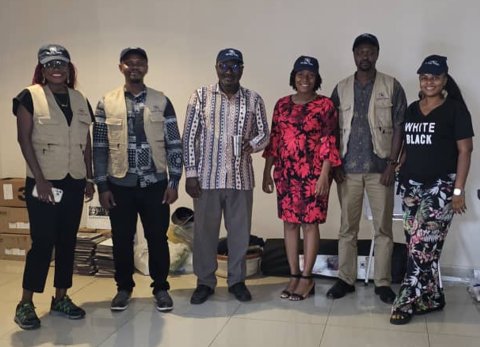By Juliet Glassroth
The strength of the STOP Spillover project lies in its incredible team members. To showcase their important contributions, we’re excited to introduce you to some of the individuals working tirelessly in countries and communities around the world. Our first spotlight features Dr. Edward Magbity, the team lead for STOP Spillover in Sierra Leone.
Read on to learn more about Dr. Magbity and his impactful work.
How did you get involved in the STOP Spillover work in your country? What made you interested in this work?
Edward: My background is looking at disease control. Throughout my career, I have been involved in health research, particularly malaria, epidemiology, and entomology. I studied the distribution of vector insects that cause disease.
Before working with this project, I was working as a monitoring and evaluation specialist in Sierra Leone’s Ministry of Health. I worked with almost all of the units in the ministry, including One Health, disease prevention, and infectious disease. Because I understood a lot of the work they did, I could hit the ground running on STOP Spillover.
Is there a particular story from the work you have done with STOP Spillover that exemplifies the work being done? Something that comes to mind immediately when you reflect on this project?
Edward: I learned that, when you work with people, leadership among them is very important. If you are working with communities and their leadership is weak, or there is no leadership, the project fails.
When we began working in the wild meat market, we encountered a significant challenge: the designated leader was not recognized or accepted by the community. This created serious issues, so we had to address the leadership structure within the market. We engaged with the Chiefdom authority, consulted various stakeholders, and collaborated with the women in the market to organize an election.
We took the time to explain that leadership is about representation—having someone who ensures their voices are heard. We emphasized that the leader was not their boss but a bridge-builder, creating opportunities for recognition and progress. Without a leader recognized by the community, it’s incredibly difficult to initiate or sustain meaningful change.
In your mind, why was the STOP Spillover project so important to your country?
Edward: The memories of the Ebola outbreak remain deeply painful. We still haven’t fully addressed the root cause—its presence in bats—which means another outbreak is highly likely. We must ensure that we never face a tragedy like the devastating events of 2014 and 2015 again. The death toll was unbearable.
Meanwhile, other zoonotic diseases, such as Lassa fever and Mpox, are looming threats. Lassa, once confined to specific areas, is now spreading more widely. In the event of spillover, the critical question is: how can we respond effectively to prevent these outbreaks from escalating?
What do you see as the most significant challenges in achieving the One Health goals in your country?
Edward: Initially, it was getting the three sectors on board—health, animal, and environment. The health part, because of different outbreaks we’ve had in the past—understands the disease and how to manage it in humans. In agriculture, sometimes they get outbreaks like anthrax, so they somewhat know how to manage it. The environmental sector is the weakest. We need to strengthen it and get them to understand what to do, especially how the environment contributes to spillover. We need to significantly strengthen capacity across the board. Even within the health sector, there are numerous gaps and areas where we lack resilience. If a major health crisis were to occur tomorrow, we would still face considerable challenges in responding effectively.
What are you most excited about in terms of progress in spillover and other areas of the One Health agenda in your country? Globally?
Edward: In Sierra Leone, through managing COVID and Ebola, there was a structure and various stakeholders that worked together to address (those crises). The government recognized the need to improve preparedness and developed a special agency, the National Public Health Agency, to deal with infectious disease and One Health. That is a big leap forward. It shows political commitment and support from different partners.
Globally, there is now a lot of interest in studying and learning about emerging diseases. There is a global movement to understand and expand One Health beyond animal, human, and environment to include other disciplines. People are trying to understand things like AMR (antimicrobial resistance) and addressing these issues together. That recognition is important. Globally, we seem to be getting our act together.
If you could tell decision makers in your country and around the world one thing about the work of STOP Spillover, what would it be?
Edward: Let’s not forget the community. Spillovers start and end with the community. If we set up all our systems at the national level, then we have left our back door open. And, we have left our front door open, too. That’s where spillover starts, in communities that are closest to the animal habitats.
Is there anything else you’d like us to know?
Edward: We plan on publishing the findings (of the work done in Sierra Leone) so more people will learn from the experiences. I hope it will be beneficial to the rest of the world.
